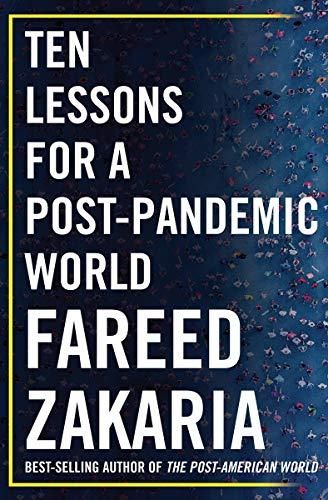What has the COVID-19 pandemic revealed about global society, and can the crisis render the world more just, productive and capable?

What the Pandemic Has (and Hasn’t) Changed
As COVID-19 rages on, it would be easy to dismiss Ten Lessons for a Post-Pandemic World, published in late 2020, as premature. However, journalist and longtime CNN host Fareed Zakaria does a solid job of explaining why many of the lessons people are learning from the pandemic actually reflect longer term trends that the coronavirus has amplified. Although some conclusions he draws may be obvious to any reader who follows the news, Zakaria is particularly adept at connecting the dots and synthesizing information into digestible takeaways. Though his historical parallels can at times feel a bit far-reaching or overly simplistic, they are more often apt and thought-provoking. Readers will also appreciate that Zakaria maintains a positive and resilient attitude in the face of a situation that has driven so many other pundits and writers to hand-wringing and despair.
Retreat and Advance
Zakaria examines both ancient and recent history to make a convincing argument that the pandemic will push the world toward greater globalization. The question is how to make this path fair, sustainable and peaceable — and Zakaria has ideas about that, too. He writes that COVID-19 has driven the international community back to its old ways: inward-looking, with many borders closed and each nation fending for itself. Still, for the author, the pandemic has only highlighted the need for international cooperation. Despite ongoing protectionism and isolationism – which COVID-19 only accelerated – the door to globalism can’t slam shut. Zakaria argues that the post-pandemic inward turn is merely a blip in a broader trajectory of increasing trade openness.
China and the United States
The pandemic shined a spotlight on the tensions between the United States and China. The only real threat to continued globalization, Zakaria posits, is competition between the two. He believes that it is possible for both powers to co-exist and assert influence in tandem through diplomacy and cooperation.
The pandemic served as a forced mass product testing for digital life – and for the most part, our technological tools passed.Fareed Zakaria
COVID-19 also showed that the world has irrevocably turned digital. Health care, entertainment, exercise, education and work, all in virtual settings, are the new normal, and they may continue to be long after the pandemic ebbs. The coronavirus also worsened economic inequality and underscored just how inequitable societies have become. Zakaria suggests that ideas like universal basic incomes and universal health care could provide a safety net for those displaced by instability.
Innovation and Government
Contrary to some experts, Zakaria believes that, although many people fled cities in the wake of the pandemic, urbanization will not halt or reverse. Cities are centers of public health innovation, productivity, political progress and environmental sustainability.
Zakaria also notes that the diverse array of responses to COVID-19 shows that it is not the size but the quality of government that matters. Most people expected that the United States would have fared better during the pandemic, but death and infection rates within other democracies, such as Canada, New Zealand, Taiwan and Germany, suggest that the failure to gain control of COVID-19 was not a failure of democracy writ large but was, rather, specific to America, with its overly complex bureaucracy, susceptibility to corruption and poor infrastructure. Addressing these underlying problems with innovation, Zakaria argues, will make American government more effective.
Losing Faith in Institutions
Zakaria suggests that governments failed or succeeded in their responses to COVID-19 based on how well they shielded their citizens from the negative effects of market capitalism, which is not socially or environmentally sustainable. He describes how Americans across the political spectrum are warming to the idea of a society that redistributes wealth more aggressively and how they are becoming more skeptical of the premise that the free market can solve economic inequality.
Market-centric thinking has invaded every area of human life, leaving little space for other values like fairness, equality or intrinsic value.Fareed Zakaria
The public might understandably be losing faith in markets, but their eroding trust in experts is far riskier, Zakaria concludes. He advises that experts should do a better job of listening and responding to the public’s concerns without oversimplification, overstatement or condescension.
Coming Together
For Zakaria, the pandemic highlighted yet another long-term trend: the one toward cynicism, complacency and individualism. He points out that past global crises, like World War II, ultimately deepened international cooperation. Like a war, the pandemic seems rife with conflict and division, yet it could be an opportunity to impart a dose of the same idealism that led to the creation of the United Nations and the European Union: the hope that unity could help the world surmount its challenges.
Zakaria offers that the liberal international order had yet to reach its golden age before COVID-19 set in, and that rumors of its demise are much exaggerated. As much conflict, misery and hypocrisy as the post-WWII system contained, it still, when seen in a larger historical picture, significantly improved lives globally. Rather than fearing a new multilateral order in which America is no longer the dominant voice, Zakaria counsels that the United States must remember that the ideals that underpinned its rise still apply today.









